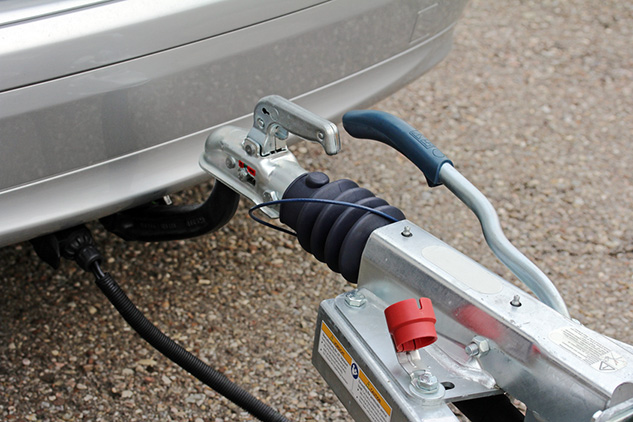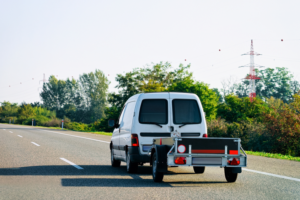How to stay safe when towing vehicles or trailers
Written by: Simon Pavey, Last updated:3rd February 2022

Your business may have a need for towing vehicles or trailers full of precious cargo. There are however some rules and regulations that must be adhered to.
Do you need a license to tow a trailer or vehicle?
The rules regarding who is allowed to tow can differ depending on when the driver passed their driving test. In addition to this, the rules changed towards the end of 2021, meaning there are some additional considerations involved.
The differing rules relate to the “maximum authorised mass” or MAM. This refers to the maximum weight of the vehicle and trailer combination once it is loaded. Therefore, knowing the weight of the contents of your trailer is vital so that you aren’t exceeding any legal limits.
Towing rules for licenses issued before 1997
If you passed your driving test before 1st January 1997, you have the most flexibility regarding what you are legally allowed to tow.
Your vehicle and trailer combination must weigh 8,250kg or less.
Towing rules for licenses issued after 1997
Following the changes to the rules, drivers who passed their tests after 1997 will no longer have strict weight limits imposed on them.
If you fall into this category, you’ll be permitted to tow a trailer that weighs up to 3,500kg MAM. Remember to check the government website for more information.
Despite these changes and additional freedoms permitted, drivers must still take care to ensure they are sticking to the weight limit. Towing a trailer that is heavier than you are permitted to do so could get you a £1,000 fine, and you could have your license taken away!
Staying safe whilst towing
Take extra care when overtaking
It’s important to remember that when towing a trailer, your vehicle is much longer. This affects how long it will take you to overtake cyclists or pedestrians, so be sure to give them plenty of space when doing so.
The extra weight that you are carrying will increase the time it takes your vehicle to accelerate and means your brakes will have to work harder to come to a full stop. Maintain a safe distance behind other vehicles, and make sure you have enough time to overtake if it is necessary.
Ensure you have the correct equipment
When towing a trailer or caravan, you should use the safety equipment listed below.
- “Type approved” towing bars. Type approval is governed by the Vehicle Certification Agency, and ensures that equipment such as tow bars are made to a certain standard. If your vehicle was registered before 1998, you do not need a type approved towing bar.
- Towing stabiliser. These can be fitted to your tow bar. When you tow a trailer, for example, there is always the risk that you could lose control, especially at high speeds. A stabiliser gives you that extra security, especially in dangerous weather conditions such as high winds.
- Towing mirrors. When you are towing a vehicle, this can negatively impact your view of the road behind you. This is especially true if your trailer if wider than your vehicle. Suitable towing mirrors are widely available, and give you increased visibility. Failure to use towing mirrors could result in a fine and points on your license, as driving with compromised vision puts other drivers in danger.
- Trailer brakes. This is only necessary for trailers that weigh over 750kg, although some lighter trailers are fitted with braking systems by default. Trailer brakes can either be mechanical or require an electrical connection to the towing vehicle.
Carrying out safety checks
Much like a HGV, it could be dangerous to start towing without carrying out rigorous safety checks first.
Of course, the first thing to check is that all components are securely connected. You must check that the breakaway cable is securely attached as well – this will activate the trailer’s brakes if it becomes detached from the towing vehicle.
Your tires must not have any cuts or bulges – this is true regardless of whether you are towing or not. The tires on your towing vehicle may also need extra inflating. Consult the manufacturer’s specification – it should tell you what condition your tires must be in for the weight that you are pulling.
It is also essential that all lights are working as they should. Trailers mean that other drivers can’t see your brake lights, so the trailer should have some fitted.
Finally, you must take care not to overload the trailer. What constitutes as overloaded depends on the type of trailer and vehicle combination you are using, whether it has a braking system, and what your license permits you to tow.
Towing can hurt your fuel economy
It’s no surprise, but carrying all that extra weight means your vehicle has to work a lot harder. This means that more fuel will be burned on a journey than if you weren’t towing.
What can be done to negate this extra fuel consumption?
For businesses, a fuel card could be the answer. You can’t stop the added weight from a trailer from burning through fuel, but you can make each litre of fuel up to 10p cheaper! If you’re a business owner or fleet manager who loves to cut costs, this is the way to go.
On top of the fuel savings, a fuel card also means you get a single HMRC approved invoice to save you a great deal of time on admin, meaning you can focus on the more important aspects of fleet management.
Get in touch with Fuel Card Services today, and see how you could benefit from one of our branded fuel cards!




